Related Research Articles
Rocks is the fourth studio album by American rock band Aerosmith, released on 3 May 1976. AllMusic described Rocks as having "captured Aerosmith at their most raw and rocking." Rocks was ranked number 366 on the updated Rolling Stone's list of the 500 Greatest Albums of All Time in 2020. It has greatly influenced many hard rock and heavy metal artists, including Guns N' Roses, Metallica, and Nirvana. The album was a commercial success, charting three singles on the Billboard Hot 100, two of which reached the Top 40. The album was one of the first to ship platinum when it was released, and has since gone quadruple platinum.
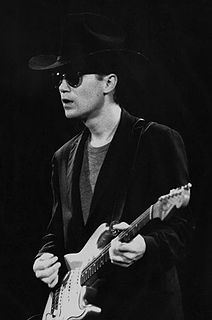
Marshall Howard Crenshaw is an American musician, singer, songwriter, and guitarist best known for hit songs such as "Someday, Someway," a US top 40 hit in 1982, "Cynical Girl," and "Whenever You're on My Mind." He is also the co-author of one of the biggest radio hits of the ‘90s, the Gin Blossoms, "Til I Hear It from You." His music has roots in classic soul music and Buddy Holly, to whom Crenshaw was often compared in the early days of his career, and whom he portrayed in the 1987 film La Bamba.
Don Dixon is an American record producer, songwriter, and musician. He is considered to be one of the key producers of what is called the jangle pop movement of the early 1980s, including working with R.E.M. and The Smithereens.
"Born on the Bayou" (1969) is the first track on Creedence Clearwater Revival's second album, Bayou Country, released in 1969. It was released as the B-side of the single "Proud Mary" that reached No. 2 on the Billboard charts. The song was covered by Little Richard.
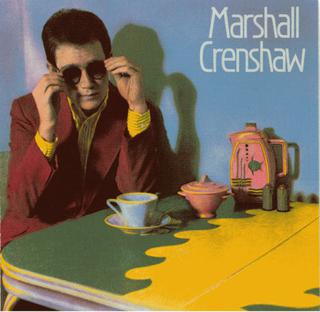
Marshall Crenshaw is the debut studio album by American musician Marshall Crenshaw. It was released on April 28, 1982, by Warner Bros. Records. Crenshaw, a performer in the musical Beatlemania, had begun to write songs for the album while staying in New York. The album was recorded with his backing band and producer Richard Gottehrer, engineer Thom Panunzio, and second engineer Jim Ball.

Good Evening is a 1989 album by Marshall Crenshaw. Although critically well-received, it failed to chart.
Marti Jones is an American singer and visual artist known for her albums and her paintings. She sings, records, and performs as "Marti Jones" and exhibits visual art as "Marti Jones Dixon."

"You're My Favorite Waste of Time" is a song written and first released by American singer Marshall Crenshaw. His 1979 home demo of the song was released as the B-side of his 1982 hit "Someday, Someway" and is available on his compilations The 9 Volt Years and This Is Easy: The Best of Marshall Crenshaw.

Field Day is the second album by American rock musician Marshall Crenshaw. Recorded quickly after the moderate success of his self-titled debut album, Field Day featured a change in style and production after Crenshaw switched producers from Richard Gottehrer to Steve Lillywhite. The recording of the album was remembered positively by Crenshaw as was the album's sound.

"Some Hearts" is a song written by Diane Warren. The track was originally written for Belinda Carlisle, who recorded it as a demo for her 1987 Heaven on Earth album, but it was not included on the album. It was released as a single by Marshall Crenshaw from his 1989 album, Good Evening, but it failed to chart. Singers that have covered the song include Kelly Levesque, featured in the 2001 film America's Sweethearts, Maria Arredondo for her 2004 album Not Going Under, and Carrie Underwood for her debut album of the same name.
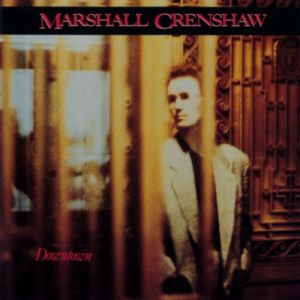
Downtown is the third album by singer/songwriter Marshall Crenshaw. Recorded after the relative failure of his album Field Day, Downtown was a departure from his previous albums due to its more rootsy sound.

Mary Jean & 9 Others is the fourth album by singer-songwriter Marshall Crenshaw. The album was produced by Don Dixon, who co-wrote the track "Calling Out for Love " with Crenshaw.

Life's Too Short is the sixth album by singer/songwriter Marshall Crenshaw.

"Someday, Someway" is a 1982 song by American rock musician Marshall Crenshaw. The song was released on his 1982 debut album, Marshall Crenshaw.

"Whenever You're on My Mind" is a 1983 song by American rock musician Marshall Crenshaw. The song was released on his 1983 album Field Day. The song, notable for its booming production, originally was written during the making of Crenshaw's debut album but was saved for his second album release. Crenshaw felt the song was his best to date, and the song was released as Field Day's first single.
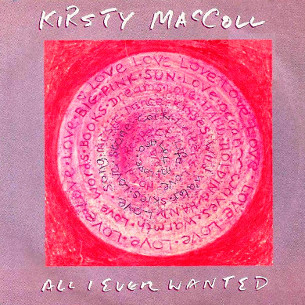
"All I Ever Wanted" is a song by British singer-songwriter Kirsty MacColl, which was released in 1991 as the third and final single from her third studio album Electric Landlady. It was written by MacColl and Marshall Crenshaw, and produced by Steve Lillywhite.
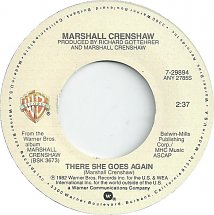
"There She Goes Again" is a 1982 song by American rock musician Marshall Crenshaw. The song was released on his 1982 debut album, Marshall Crenshaw. Lyrically, the song was written about seeing a girl from one's window as she passes by in a car, an image that Crenshaw later said was inspired by his youth.

"Cynical Girl" is a 1982 song by American rock musician Marshall Crenshaw. The song was released on his 1982 debut album, Marshall Crenshaw. Written as a satire on the "mass culture" that Crenshaw disliked, the song was not based on a specific girl.
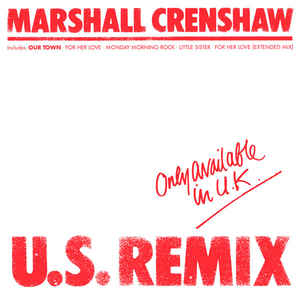
"Our Town" is a 1983 song by American rock musician Marshall Crenshaw. The song was released on his 1983 album Field Day. Written as an ode to Crenshaw's hometown at the time, New York City, the song features a melody inspired by Babs Cooper's version of "Honest I Do," a record that Crenshaw had heard in his childhood.

"Blues Is King" is a 1985 song by American rock musician Marshall Crenshaw. The song was released on his 1985 album Downtown. Originally written as an instrumental titled "Bruce Is King," the song features lyrics inspired by the B.B. King album Blues Is King.
References
- 1 2 3 4 Lanthier, Joseph Jon. "Interview: Marshall Crenshaw on Field Day, Upcoming Solo Shows, and More". Slant. Retrieved 8 June 2020.
- 1 2 3 4 5 6 7 8 Tedaldi, Justin. "Q&A with Marshall Crenshaw on his 30th anniversary shows". Examiner via Popdose. See "For an even longer interview with Crenshaw about his debut, including track-by-track analysis, check out this page". Archived from the original on 28 April 2012. Retrieved 30 May 2020.
- ↑ Murray, Noel. "Marshall Crenshaw on songwriting, covers, and the album cover he absolutely hates". The AV Club. Retrieved 30 January 2019.
- ↑ Hyperbolium. "EP Review: Marshall Crenshaw – Stranger and Stranger (Addie-Ville, 2013)". No Depression. Retrieved 8 June 2020.
- ↑ Matsumoto, Jon (30 September 1993). "Marshall Crenshaw, "Marshall Crenshaw" (1982); Warner Bros ". Los Angeles Times. Retrieved 8 June 2020.
- ↑ Finn, Timothy. "Marshall Crenshaw delivers an evening of pop reverie at Knuckleheads". The Kansas City Star. Retrieved 8 June 2020.
- ↑ "Exclusive: Marshall Crenshaw, "Fantastic Planet Of Love" « American Songwriter". American Songwriter. 7 June 2011. Retrieved 8 June 2020.
- ↑ Anderson, Brett (27 September 2000). "Marshall Crenshaw, Precisely". Washington Post. Retrieved 8 June 2020.
- ↑ Browne, David. "This Is Easy: The Best of Marshall Crenshaw". EW.com. Retrieved 7 June 2020.
- ↑ Catlin, Roger. "Crenshaw's Fans Still Lust After His Songs". The Hartford Courant. Retrieved 7 June 2020.
- ↑ Sheffield, Rob (2022-09-27). "100 Best Songs of 1982". Rolling Stone. Retrieved 2022-09-27.